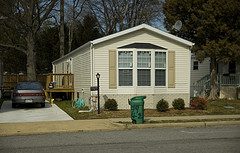
So credit Congress and HUD, which passed and implemented the so-called HUD code in the mid-1970s and helped spur the industry into modernity by requiring that manufacturers build safer, sounder and better looking homes. Also credit the industry for improving manufacturing practices and, at least in retrospect, embracing a federal regulatory mandate, something many industries are loathe to do. In addition, there are some terrific trends in the field that Winton Pitcoff covered in the Spring 2013 issue of Shelterforce. There's tremendous movement here.
That said, there is an underbelly to manufactured housing, one that can be as readily attached to the chassis of the 2013 triple-section unit on your own land as it can to the 1960s mobile home in a typical land-lease community. This isn't some glamorous granite kitchen or an ancillary insurance product. It's the financing.
Most families finance their home purchase through a mortgage from a bank, credit union or finance company. The typical mortgage, which is, thankfully, more typical today than it was five years ago, is a 30-year fixed-rate loan. Today's median interest is about 4.6 percent. That's a pretty good deal. Yet, if your home choice is a manufactured one, you'll more than likely get a car loan of sorts, maybe at 7 percent, but more likely at 12 percent or even 18 percent, and probably have the same experience as when you last bought a car. This is primarily because the homes are titled as personal property not as real estate.
About 75 percent of manufactured homes are financed through chattel, or personal property loans, even though over 70 percent of the units are on private property. Some units are on “family” or other property not directly controlled by the homeowner. Nevertheless, many of the homes now financed through chattel loans could have been financed through mortgages. There is evidence that even those homeowners who cannot, due to state laws, take out a mortgage would be able to repay the mortgages as readily as any other homeowner.
For example, New Hampshire Community Loan Fund has been making mortgage loans to unit owners in manufactured housing cooperatives for over ten years. The loan performance is excellent. And CFED's own research on the performance of mortgages for manufactured homes on fee-simple land, which was discussed in this space in March, also supports the idea that these homes, and these families, are good credit risks if the loans are done right.
So, in light of rising housing costs and constricted credit, not only does manufactured housing offer a good option for families, but a good business opportunity for lenders, and you would think for the retail industry as well, which has been suffering from a largely self-inflicted sales crisis. In 1998, the industry sold over 373,000 homes; this year industry projects sales of about 63,000 units, which would be the most since 2008. Yet, if artificial roadblocks and anticompetitive practices were not in the way, all parties would no doubt benefit from an uptick in sales.
How is this? Many manufactured homeowners buy and finance their homes through an integrated business model that is promoted and supported by the big finance, retail and manufacturing firms. While industry claims they do not steer families to in-house or affiliated lenders—and this is very hard to measure—there is no doubt that this very profitable model limits competition and raises costs to borrowers.
On the heels of a slow recovery from the housing crisis, some manufactured housing firms make 15- to 20-year chattel loans at rates over 17 percent, even to many borrowers who may have trouble repaying. Some advocates are worried that manufactured home lenders seem too concerned with profiting at the front end of the loan process rather than realizing a steady stream of payments from well-performing loans. Does this sound familiar? It should to the industry, too, which was punished at the turn of the century for poor lending practices. Between 1999 and 2002, for example, the inventory of repossessed manufactured homes quadrupled. Much of this was driven by poor securitization practices. A major problem for lenders today is that the capital markets are not interested in securitizing the products the industry is offering. After being burned so badly 15 years ago, who could blame them? And that gets us back to underwriting and titling.
Generally, much, but not all, of the industry opposes any titling reform, which would allow all manufactured homes to be titled as, believe it or not, homes. They argue, with little evidence, that reform would have no benefit to the homeowner. But homes titled as real estate are eligible for mortgages, which are less expensive, have longer terms (and thus lower monthly payments) and better consumer protections than chattel loans.
Of course, mortgage lenders have access to the secondary market, including Fannie, Freddie and the Home Loan Banks, and thus many lenders, including community banks and credit unions, make mortgages. So if more manufactured homes were eligible for less costly mortgages, because of titling reform, more lenders would enter the market, more families would be able to afford the homes, and, no doubt, retailers would sell more homes.
When you finance a home like car, the home gets treated like a car, right down to the National Automobile Dealers Association depreciation schedule industry uses to value existing manufactured homes. Imagine if mainstream home lenders used a car-style depreciation guide to measure home values. Imagine the outcry at the lost opportunities of appreciation and wealth building.
Yet it gets more unseemly. Reportedly, many manufactured housing retailers, as well as some chattel lenders, discourage buyers from attaching the unit to a foundation. This eliminates the families' chances of getting FHA financing, or loans that Fannie or Freddie would buy. This effectively eliminates the borrower (and future purchasers) in today's market from getting any sort of mortgage.
There is both a lot of potential and a lot of work to do to make manufactured housing a better and safer choice for more families. It is time for housing advocates, especially those who work in rural America and with families burned by foreclosure, to join with CFED and our partners on making the policy right for all homeowners. Together, we can make a compelling, and simple, argument: that all homes, regardless of whether they're built on site or in a factory, should be titled as homes.






Our community recently resisted, successfully to date, a manufactured home subdivision. It seemed to us the primary problem was the land lease arrangement which limited equity and provided little security for buyers. Couple this with houses with particle board floors and, as you said, proprietary— high interest— loans and it adds up to a bad deal for the residents. At the end of 20 years they would have paid a high monthly fee to own a structure that is essentially used up and sitting on land they still don’t own.
Steve, you underscore some of the biggest challenges that manufactured homeowners face: community and official opposition, based on real or perceived issues. The housing quality issue is largely moot for new units. The construction is so much better than it had been in the past. Moreover, we are seeing a sea change in how better units get to market. Next Step, for example, only markets high-quality, efficient units that it distributes through its nonprofit partners. The added quality will pay for itself in energy savings and resale value.
And, as you said, we need better financing and better security, which is exactly what CFED’s I’M HOME program is all about. I think if a developer proposed a cooperative or other means of tenure security for owners as well as a channel to better home loans, local communities like yours would be much more open to manufactured housing as a viable affordable homeownership solution.